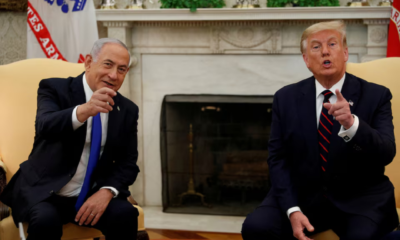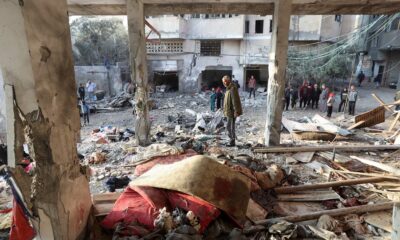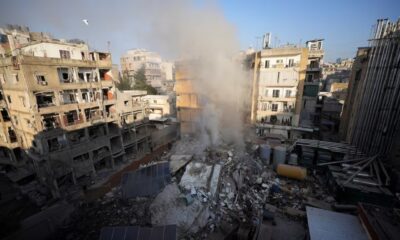World
US President Biden does not believe there will be ‘all-out-war’ in Middle East
Asked by reporters in Washington on Thursday how confident he was that such a war could be averted, Biden said, “How confident are you it’s not going to rain? Look, I don’t believe there is going to be an all-out war. I think we can avoid it.

U.S. President Joe Biden said he did not believe there is going to be an "all-out war" in the Middle East, as Israel weighs options for retaliation after Tehran's largest ever assault on its arch-enemy.
However, Biden said more needed to be done to avoid a Middle East war, as Israel's military hit Beirut with new air strikes in its battle against Lebanese armed group Hezbollah, Reuters reported.
Asked by reporters in Washington on Thursday how confident he was that such a war could be averted, Biden said, "How confident are you it's not going to rain? Look, I don't believe there is going to be an all-out war. I think we can avoid it.
"But there is a lot to do yet, a lot to do yet."
While the United States, the European Union, and other allies have called for an immediate 21-day ceasefire in the Israel-Lebanon conflict, Biden said the U.S. was discussing with Israel its options for responding to Tehran's assault, which included Israel striking Iran's oil facilities.
"We're discussing that," Biden told reporters.
His comments contributed to a surge in global oil prices, and rising Middle East tension has made traders worry about potential supply disruptions.
However, Biden added: "There is nothing going to happen today." Asked later if he was urging Israel not to attack Iran's oil installations, Biden said he would not negotiate in public.
On Wednesday, the president said he would not support any Israeli strike on Iran's nuclear sites.
On Thursday, Israel's ambassador to the United Nations, Danny Danon, told CNN his country had "a lot of options" for retaliation and would show Tehran its strength "soon".
A U.S. official said Washington did not believe Israel had decided yet how to respond to Iran.
Beirut's southern suburb of Dahiye, a stronghold of the Iran-backed Hezbollah, came under renewed strikes near midnight on Thursday after Israel ordered people to leave their homes in some areas, residents and security sources said.
The air raids targeted Hezbollah official Hashem Safieddine, rumoured successor to its assassinated leader Hassan Nasrallah, in an underground bunker, Axios reporter Barak Ravid said on X, citing three Israeli officials.
Safieddine's fate was not clear, he said.
Israel's military declined comment.
Israel said Hezbollah launched about 230 rockets from Lebanon towards Israel on Thursday.
Hezbollah said it targeted what it called Israel's "Sakhnin base" for military industries in Haifa Bay on the Mediterranean coast of northern Israel with a salvo of rockets.
Late on Thursday, Hezbollah said it also targeted Israel's "Nesher base" in Haifa with a salvo of Fadi 2 rockets.
G7 CALLS FOR RESTRAINT
Israeli Prime Minister Benjamin Netanyahu has vowed Iran will pay for Tuesday's missile attack, and Washington said it would work with its longtime ally to ensure Iran faced "severe consequences."
Iranian President Masoud Pezeshkian, speaking in Doha, said on Thursday that Tehran would be ready to respond.
"Any type of military attack, terrorist act or crossing our red lines will be met with a decisive response by our armed forces," he said.
Israel, which has been fighting Hamas in the Palestinian territory of Gaza for almost a year, sent troops into southern Lebanon on Tuesday after two weeks of intense airstrikes in a worsening conflict that has drawn in Iran and risks involving the United States.
The Group of Seven nations, which includes the U.S., Britain and allies, on Thursday condemned Iran's missile attack on Tuesday and reaffirmed their commitment to Israel's security.
But the group also called for restraint, a ceasefire in Gaza and halt to hostilities in Lebanon.
"A dangerous cycle of attacks and retaliation risks fuelling uncontrollable escalation in the Middle East, which is in no one's interest," it said in a statement.
Qatar's Emir Sheikh Tamim bin Hamad Al-Thani also urged serious ceasefire efforts to stop what he called Israel's aggression.
The chairman of the U.S. House of Representatives Foreign Affairs Committee urged the U.S. president on Thursday to speed up weapons shipments to Israel, including 2000-pound (907 kg) bombs held up for months over human rights concerns.
One 2,000-pound bomb can rip through thick concrete and metal, creating a wide blast radius.
Representative Michael McCaul said in a letter sent to Biden and seen by Reuters that such large bombs were operationally necessary as Hamas and Hezbollah were using deeply buried subterranean bunkers and tunnels.
HEZBOLLAH SAYS IT KILLED 17 ISRAELI TROOPS
Israel says its operations in Lebanon seek to allow tens of thousands of its citizens to return home after Hezbollah bombardments during the Gaza war forced them to evacuate from its north.
More than 1.2 million Lebanese have been displaced by Israeli attacks, and nearly 2,000 people have been killed since the start of the Israeli attacks on Lebanon over the last year, most of them in the past two weeks, Lebanese authorities said.
Early on Friay, Lebanon's health ministry said 27 people were killed and 151 wounded over the prior day.
Hezbollah says it has repelled several land operations by Israeli troops, with measures such as ambushes and direct clashes.
The group said it killed 17 Israeli military personnel in combat in southern Lebanon on Thursday, citing its field and security sources. Israeli forces did not comment on the claim.
An Israeli strike killed at least 18 people on Thursday in the Tulkarm refugee camp in the occupied West Bank, the Palestinian health ministry said, and Israel said it killed a Hamas official in Tulkarm.
World
Biden approves $571 mln in defense support for Taiwan

U.S. President Joe Biden on Friday agreed to provide $571.3 million in defense support for Taiwan, the White House said, while the State Department approved the potential sale to the island of $265 million worth of military equipment.
The United States is bound by law to provide Chinese-claimed Taiwan with the means to defend itself despite the lack of formal diplomatic ties between Washington and Taipei, to the constant anger of Beijing, Reuters reported.
Democratically governed Taiwan rejects China's claims of sovereignty.
China has stepped up military pressure against Taiwan, including daily military activities near the island and two rounds of war games this year.
Taiwan went on alert last week in response to what it said was China's largest massing of naval forces in three decades around Taiwan and in the East and South China Seas.
Biden had delegated to the secretary of state the authority "to direct the drawdown of up to $571.3 million in defense articles and services of the Department of Defense, and military education and training, to provide assistance to Taiwan," the White House said in a statement without providing details.
Taiwan's defense ministry thanked the United States for its "firm security guarantee", saying in a statement the two sides would continue to work closely on security issues to ensure peace in the Taiwan Strait.
The Pentagon said the State Department had approved the potential sale to Taiwan of about $265 million worth of command, control, communications, and computer modernization equipment.
Taiwan's defense ministry said the equipment sale would help upgrade its command-and-control systems.
Taiwan's defense ministry also said on Saturday that the U.S. government had approved $30 million of parts for 76 mm autocannon, which it said would boost the island's capacity to counter China's "grey-zone" warfare.
World
Trump-backed spending deal fails in House, shutdown approaches

A spending bill backed by Donald Trump failed in the U.S. House of Representatives on Thursday as dozens of Republicans defied the president-elect, leaving Congress with no clear plan to avert a fast-approaching government shutdown that could disrupt Christmas travel.
The vote laid bare fault lines in Trump's Republican Party that could surface again next year when they control the White House and both chambers of Congress, Reuters reported.
Trump had pressured lawmakers to tie up loose ends before he takes office on Jan. 20, but members of the party's right flank refused to support a package that would increase spending and clear the way for a plan that would add trillions more to the federal government's $36 trillion in debt.
"I am absolutely sickened by a party that campaigns on fiscal responsibility and has the temerity to go to the American people and say you think this is fiscally responsible," said Republican Representative Chip Roy, one of 38 Republicans who voted against the bill.
The package failed by a vote of 174-235 just hours after it was hastily assembled by Republican leaders seeking to comply with Trump's demands. A prior bipartisan deal was scuttled after Trump and the world's richest person Elon Musk came out against it on Wednesday.
Republican House Speaker Mike Johnson provided no details when reporters asked him about next steps after the failed vote.
"We will come up with another solution," he said.
Government funding is due to expire at midnight on Friday. If lawmakers fail to extend that deadline, the U.S. government will begin a partial shutdown that would interrupt funding for everything from border enforcement to national parks and cut off paychecks for more than 2 million federal workers. The U.S. Transportation Security Administration warned that travelers during the busy holiday season could face long lines at airports.
"Congress must get rid of, or extend out to, perhaps, 2029, the ridiculous Debt Ceiling. Without this, we should never make a deal," Trump said in a post on Truth Social hours after the bill failed.
Thursday's unsuccessful bill largely resembled the earlier version that Musk and Trump had blasted as a wasteful giveaway to Democrats. It would have extended government funding into March and provided $100 billion in disaster relief and suspended the debt. Republicans dropped other elements that had been included in the original package, such as a pay raise for lawmakers and new rules for pharmacy benefit managers.
At Trump's urging, the new version also would have suspended limits on the national debt for two years -- a maneuver that would make it easier to pass the dramatic tax cuts he has promised.
Johnson before the vote told reporters that the package would avoid disruption, tie up loose ends and make it easier for lawmakers to cut spending by hundreds of billions of dollars when Trump takes office next year.
"Government is too big, it does too many things, and it does few things well," he said.
TEEING UP TAX CUT
Democrats blasted the bill as a cover for a budget-busting tax cut that would largely benefit wealthy backers such as Musk, the world's richest person, while saddling the country with trillions of dollars in additional debt.
"How dare you lecture America about fiscal responsibility, ever?" House Democratic Leader Hakeem Jeffries said during floor debate.
Even if the bill had passed the House, it would have faced long odds in the Senate, which is currently controlled by Democrats. The White House said Democratic President Joe Biden did not support it.
Previous fights over the debt ceiling have spooked financial markets, as a U.S. government default would send credit shocks around the world. The limit has been suspended under an agreement that technically expires on Jan. 1, though lawmakers likely will not have to tackle the issue before the spring.
When he returns to office, Trump aims to enact tax cuts that could reduce revenues by $8 trillion over 10 years, which would drive the debt higher without offsetting spending cuts. He has vowed not to reduce retirement and health benefits for seniors that make up a vast chunk of the budget and are projected to grow dramatically in the years to come.
The last government shutdown took place in December 2018 and January 2019 during Trump's first White House term.
The unrest also threatened to topple Johnson, a mild-mannered Louisianan who was thrust unexpectedly into the speaker's office last year after the party's right flank voted out then-Speaker Kevin McCarthy over a government funding bill. Johnson has repeatedly had to turn to Democrats for help in passing legislation when he has been unable to deliver the votes from his own party.
He tried the same maneuver on Thursday, but this time fell short.
Several Republicans said they would not vote for Johnson as speaker when Congress returns in January, potentially setting up another tumultuous leadership battle in the weeks before Trump takes office.
World
North Korean troops suffer 100 deaths, struggling in drone warfare, South Korea says
More than 10,000 North Korean troops have been deployed to help Russia in the war, according to U.S. and South Korean officials.
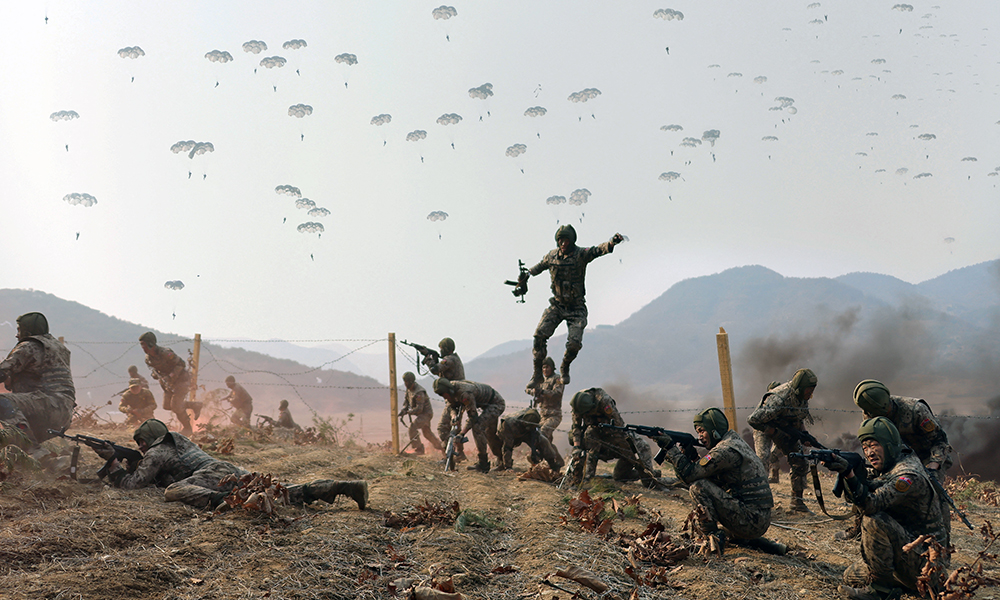
At least 100 North Korean troops deployed to Russia have been killed with another 1,000 injured in combat against Ukrainian forces in intense fighting in the Kursk region, Reuters cited a South Korean lawmaker said on Thursday citing the country's spy agency.
The heavy losses are attributed to the lack of experience by North Korean troops in drone warfare and unfamiliarity with the open terrain where they are taking part in the battle, a member of parliament Lee Seong-kweun told reporters.
Lee was speaking after a closed-door briefing by the National Intelligence Service (NIS) to parliament.
The discrepancy in the estimate of the troops killed from that made by a U.S. military official who cited several hundred casualties is because of the relatively conservative analysis by the NIS, Lee said.
"There was a report that there have been at least 100 deaths and the injured are approaching 1,000," he said.
There are indications that the North is preparing for additional deployment, Lee said, including intelligence of the country's leader Kim Jong Un overseeing training, read the report.
The report echoed comments by U.S. and Ukrainian officials that North Korean losses are heavy and that Russia was using them in large numbers in assaults in Kursk, a Russian region where Ukraine launched a cross-border incursion in August.
More than 10,000 North Korean troops have been deployed to help Russia in the war, according to U.S. and South Korean officials. Pyongyang has also shipped more than 10,000 containers of artillery rounds, anti-tank rockets as well as mechanised howitzers and rocket launchers.
Neither the North nor Russia have officially acknowledged the troop deployment or the weapons supply.
Russian President Vladimir Putin visited Pyongyang in June and signed a "comprehensive strategic partnership" treaty with North Korean leader Kim Jong Un that included a mutual defence pact.
Earlier on Thursday, North Korea said its military alliance with Russia is proving "very effective" in deterring the United States and its "vassal forces," denouncing a recent statement by Washington and allies against ties between Pyongyang and Moscow, Reuters reported.
North Korea made no mention of its involvement in the war in Ukraine or casualties.
Instead it denounced a statement by the United States and nine countries and the European Union issued on Monday as "distorting and slandering the essence of the normal cooperative relations" between the North and Russia.
In a statement by an unnamed foreign ministry spokesman, the North blamed Washington and its allies for prolonging the Ukrainian war and destabilising the security situation in Europe and Asia-Pacific.
"It is because of the misguided acts of the U.S. and the West persisting in their structure-destructive, hegemony-oriented and adventuristic military policy," it said.
-
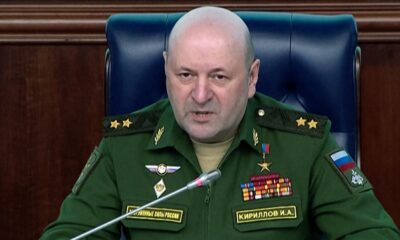
 Regional5 days ago
Regional5 days agoBomb kills chief of Russian nuclear protection forces in Moscow
-

 Sport5 days ago
Sport5 days agoATN once again seals deal to broadcast upcoming IPL across Afghanistan
-

 Sport5 days ago
Sport5 days agoLanka T10: All three matches abandoned due to rain
-

 Latest News5 days ago
Latest News5 days agoIndia hoping to import coal and marble from Afghanistan
-

 Sport4 days ago
Sport4 days agoZimbabwe’s opening ODI against Afghanistan abandoned
-

 Latest News5 days ago
Latest News5 days agoFuel prices rise in Herat as winter approaches
-

 Latest News5 days ago
Latest News5 days agoJapan announces $27.5 million aid package to Afghanistan
-

 Latest News3 days ago
Latest News3 days agoTwo horror accidents on Kabul-Kandahar highway leave 52 dead


